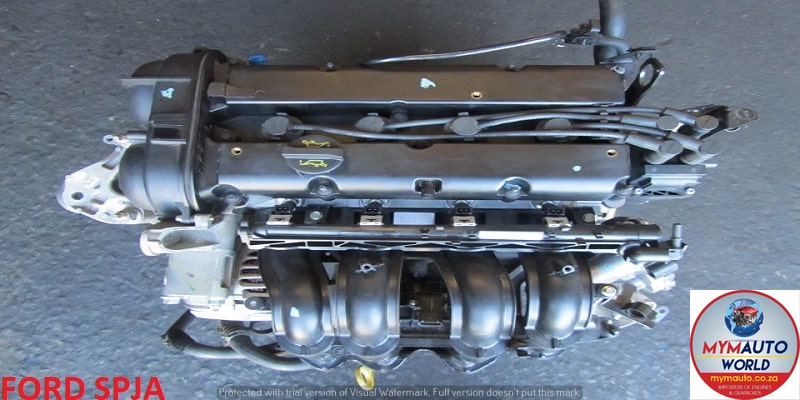Expert Tips for Optimizing Your Ford Fiesta Engine Efficiency
Wiki Article
Unlocking the Power of Engines: A Comprehensive Overview to Efficiency and Performance
Comprehending the detailed technicians of engines is crucial for both performance fanatics and day-to-day drivers. The answers might redefine our approach to engine performance and performance in ways that are both informing and essential.Understanding Engine Basics
What constitutes the basic auto mechanics of an engine? At its core, an engine is a maker designed to transform gas into mechanical power with a series of controlled explosions or combustion procedures.The crankshaft then changes this direct movement right into rotational power, which ultimately powers the lorry. The camshaft controls the opening and closing of the valves, controling the consumption of air and gas and the expulsion of exhaust gases. Furthermore, the engine counts on a meticulously adjusted fuel-air mixture, ignition system, and cooling down system to make sure optimal efficiency and effectiveness.
Understanding engine essentials likewise entails acknowledging the significance of engine cycles, such as the four-stroke cycle, that includes intake, compression, exhaust, and power strokes. Each phase is important in ensuring the engine works efficiently and successfully. Mastery of these essential technicians lays the groundwork for discovering more intricate engine dynamics and efficiency metrics, essential for enhancing both power result and efficiency.
Secret Performance Metrics
Key performance metrics are crucial for assessing an engine's effectiveness and power outcome, providing important understandings for both suppliers and consumers. These metrics act as criteria for engine efficiency, permitting for informed decisions in manufacturing, buying, and style.One of the main metrics is horse power, which evaluates the engine's ability to do job over time. Torque, determined in pound-feet, is an additional important statistics that suggests the engine's rotational pressure, directly impacting velocity and hauling capacity. Fuel efficiency, generally measured in miles per gallon (MPG) or liters per 100 kilometers (L/100km), evaluates exactly how successfully the engine converts fuel into activity, influencing environmental considerations and operational expenses.
Furthermore, thermal efficiency measures just how well an engine transforms fuel energy into useful job, disclosing insights into power losses largely via warm. Emission degrees, consisting of CO2 and NOx, are also crucial, reflecting the engine's ecological effect and conformity with governing standards.

Tuning Methods for Performance
Tuning strategies play a considerable function in improving engine performance by maximizing efficiency metrics recognized in earlier discussions (ford fiesta engine). Different techniques exist to adjust an engine, each adding to boosted fuel economic situation and lowered exhaustsOne reliable strategy is readjusting the air-fuel proportion, making certain the engine runs within the optimum burning regimen. A leaner combination can boost gas performance, yet it should be balanced to avoid misfires or engine knock. Furthermore, reprogramming the engine monitoring system can recalibrate parameters such as ignition timing, which even more improves efficiency while keeping power output.
One more crucial technique includes modifying the consumption and exhaust systems. Updating to high-performance air filters and exhaust headers can reduce back stress, promoting far better air flow. This allows the engine to take a breath even more freely, leading to boosted combustion efficiency.
Furthermore, the execution of sophisticated tuning tools, like dyno screening, offers precise information that allows targeted changes. Home Page Consistently keeping an eye on these performance metrics makes certain that tuning initiatives generate the wanted effectiveness outcomes. Jointly, these techniques not just bolster engine efficiency yet likewise add to long-lasting sustainability in engine procedures.
Maintenance for Optimum Performance
Regular engine upkeep is vital for attaining ideal efficiency and longevity. A well-kept engine not only runs efficiently but likewise decreases the risk of pricey repair services and malfunctions. Secret components needing normal attention include oil, filters, belts, and ignition system.Transforming the engine oil at advised intervals is important, as oil lubricates relocating parts and protects against overheating. Changing oil and air filters guarantees that pollutants do not hinder engine feature. Neglecting these components can lead to decreased effectiveness and possible engine damages.
In addition, inspecting and replacing worn belts and tubes is crucial to avoid unexpected failures. Timing belts, particularly, should be replaced according to the producer's timetable to prevent disastrous engine damage.
Ignition system must additionally be examined and changed as needed, since they play an important function in recommended you read ignition and fuel effectiveness.
Future Trends in Engine Technology
Embracing improvements in technology, the future of engine layout is positioned to change efficiency and effectiveness across various applications. Among one of the most considerable patterns is the shift toward electrification. Hybrid and totally electrical powertrains are ending up being progressively mainstream, offering lowered exhausts and boosted fuel efficiency. This transition is not just a pattern however a need driven by governing stress and consumer need for sustainable solutions.In addition, innovations in products scientific research are bring about lighter, stronger parts that improve engine performance while minimizing power consumption. Advanced manufacturing strategies, such as 3D printing, permit the production of complex geometries that read boost airflow and thermal administration, thus enhancing burning processes.
Additionally, the assimilation of synthetic intelligence and artificial intelligence is established to transform engine diagnostics and performance tuning. These modern technologies can evaluate huge amounts of data in actual time, enabling anticipating upkeep and customized performance improvements.
Conclusion
In conclusion, unlocking the power of engines requires a comprehensive understanding of their auto mechanics and performance metrics. Carrying out efficient tuning techniques and adhering to regular upkeep techniques dramatically boost engine capacities.Additionally, the engine counts on a thoroughly adjusted fuel-air blend, ignition system, and cooling system to ensure optimum performance and efficiency.
Comprehending engine fundamentals likewise involves acknowledging the importance of engine cycles, such as the four-stroke cycle, which consists of intake, power, compression, and exhaust strokes. Proficiency of these basic mechanics lays the foundation for exploring a lot more complex engine characteristics and performance metrics, vital for enhancing both power output and effectiveness.

Embracing advancements in technology, the future of engine design is poised to revolutionize performance and effectiveness across different applications.
Report this wiki page